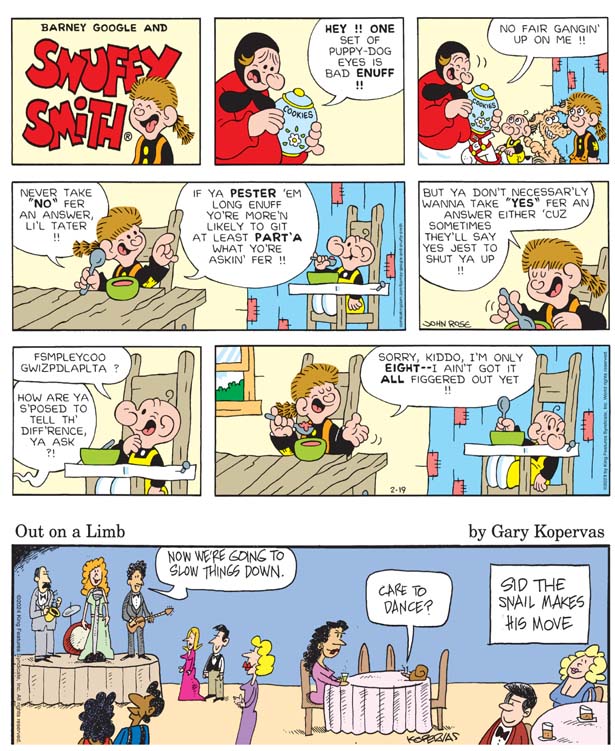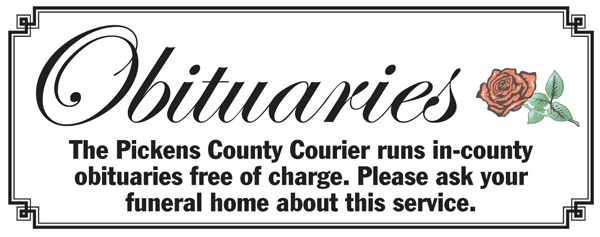Daily Archives: 02/13/2024
Durham set to run for County Council
PICKENS — I’m Justin Durham and I’m announcing my candidacy for the Republican nomination for Pickens County Council District 3 on June 11th. My Pickens County roots run deep. I was born, raised, and have spent most 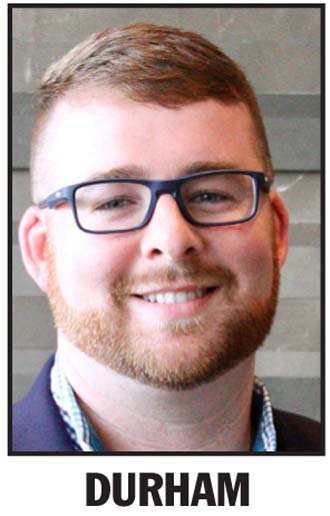 of my life in District 3. Both of my parents and three of my grandparents are life-long residents of Pickens County. In 2014, after serving in the United States Army, I came back to my roots to raise my family, earn an education, and serve my community.
of my life in District 3. Both of my parents and three of my grandparents are life-long residents of Pickens County. In 2014, after serving in the United States Army, I came back to my roots to raise my family, earn an education, and serve my community.
My vision for Pickens County is to deliver solutions for the people of District 3 in particular and Pickens County in general.
Specifically, I want to improve and maintain infrastructure,
You must be logged in to view this content.
Subscribe Today or Login
Clara Adams-Ender — from sharecropper to general
Clara Mae was 4 years old when her Daddy took her out to the barn. She wasn’t big enough to pick tobacco yet, but her Daddy said she was big enough to milk Daisy.
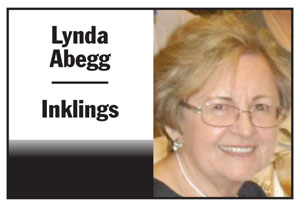 She looked up at that cow, and it seemed to be the size of an elephant. She had watched her Mama milk the cow. All she had to do was pull on one of the teats, and milk would spurt out. Except that’s not exactly how it worked. It took her Daddy an hour to teach her how to milk the cow properly.
She looked up at that cow, and it seemed to be the size of an elephant. She had watched her Mama milk the cow. All she had to do was pull on one of the teats, and milk would spurt out. Except that’s not exactly how it worked. It took her Daddy an hour to teach her how to milk the cow properly.
Clara Mae was born in Willow Springs, N.C., on July 11, 1939. She was
You must be logged in to view this content.
Subscribe Today or Login
When emotions try to control us
How often do you hear it’s not what happens to us, but how we respond?
We know we will face trials in this life, so it only makes sense to prepare how we are going to react when they  arrive. Since the way we perceive develops our thoughts and views, but what if our thoughts are wrong? The most important factor to prevent our emotions from controlling us is to realize we decide what we think about. When we bow down to our feelings they become our master. The Bible demands for our mind to be renewed which
arrive. Since the way we perceive develops our thoughts and views, but what if our thoughts are wrong? The most important factor to prevent our emotions from controlling us is to realize we decide what we think about. When we bow down to our feelings they become our master. The Bible demands for our mind to be renewed which
You must be logged in to view this content.
Subscribe Today or Login
Letters to the Editor 2-14-24
Radio system, dispatch, 911 call center
Dear Editor,
I know some of you have read the articles about the new radio system for emergency services in Pickens County. Looking at the stories, there is a bit here and then a bit there, so let me try to give you a more comprehensive picture of the plan and what is unfolding.
The radio system that is used by rescue, fire, EMS and law enforcement is a patchwork of radio systems, changes, upgrades and a tower here and another one there. As a result, often first responders can not directly communicate
You must be logged in to view this content.
Subscribe Today or Login
Soapstone Baptist Church: A Link to the Distant Past
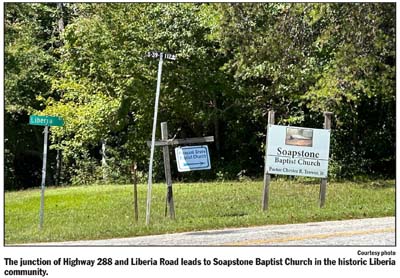
By Dr. Thomas Cloer, Jr.
Special to The Courier
Soapstone Baptist Church, a historic Black Church, is located in an area here in Upper Pickens County called 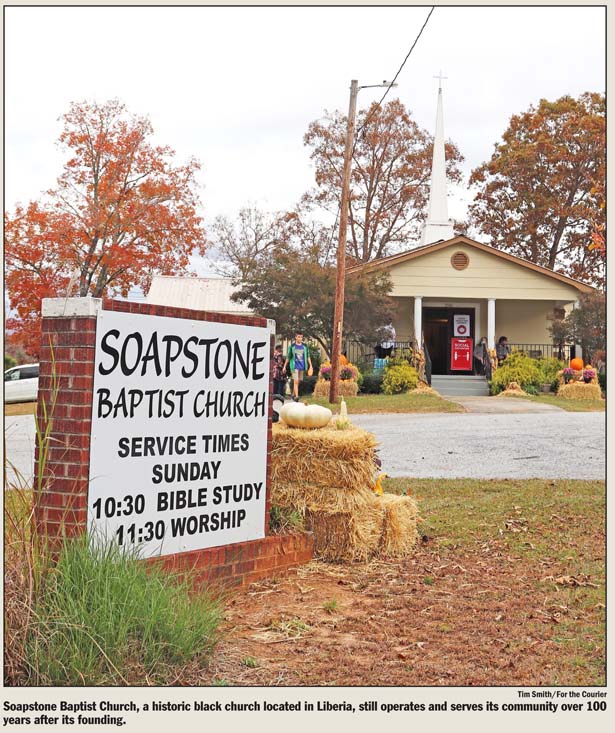 Liberia, South Carolina. The name, Liberia, dates back to the continent of Africa. As I write, Soapstone Baptist Church is still functioning on Liberia Road after all these years. The Church started shortly after President Lincoln’s Emancipation Proclamation freed those in slavery. You can attend and worship in this Black Church with people who had ancestors in slavery right here in Pickens County.
Liberia, South Carolina. The name, Liberia, dates back to the continent of Africa. As I write, Soapstone Baptist Church is still functioning on Liberia Road after all these years. The Church started shortly after President Lincoln’s Emancipation Proclamation freed those in slavery. You can attend and worship in this Black Church with people who had ancestors in slavery right here in Pickens County.
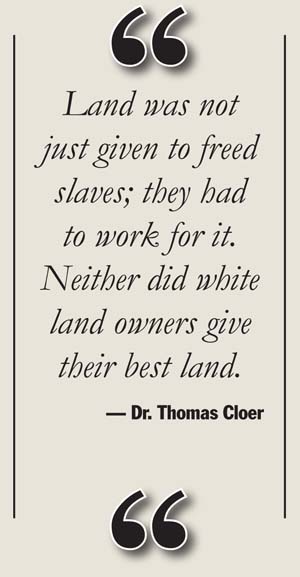 In the same year (1967) that my wife and I were finishing our undergraduate work at Cumberland College in the Kentucky Mountains, and after deciding to teach in Upper Pickens County, SC, we received some very shocking and disturbing news. White supremacists had burned and destroyed the old sacred Soapstone Baptist Church building in Liberia, not very far from Holly Springs School where we were going to teach. The old Soapstone Church had served as a refuge for freed slaves, and for the descendants of enslaved people, for over a century.
In the same year (1967) that my wife and I were finishing our undergraduate work at Cumberland College in the Kentucky Mountains, and after deciding to teach in Upper Pickens County, SC, we received some very shocking and disturbing news. White supremacists had burned and destroyed the old sacred Soapstone Baptist Church building in Liberia, not very far from Holly Springs School where we were going to teach. The old Soapstone Church had served as a refuge for freed slaves, and for the descendants of enslaved people, for over a century.
However, the soul and spirit of the historic Soapstone Church did not burn, did not die. It still functions today in a different building. I am reminded of the words of Harriet Tubman, the great Black Abolitionist who so eloquently said, “We’re rooted here now, and they can’t pull us up.” The members of Soapstone Baptist Church are indeed deeply rooted.
My Upstate South Carolina Ancestors
My Mom’s maiden name was Grace Moody. My Moody ancestors were here in the old Pickens District, now Pickens and Oconee Counties, when slavery was common. They were here by the late 1700’s. My great-great-great-great Grandfather, Daniel Moody, and his son, Martin Moody, acquired land on the Toxaway River, Devil’s Fork, Crow Creek, Little River, and on the south side of Keowee River. Daniel Moody is buried in the old Wolfpit Cemetery at the Cheohee Community Center, now in adjacent Oconee County. Cheohee Community Center is located on Cherokee Lake Road in the Cheohee Valley.
Daniel Moody’s birth date was only three years different from the eighth President of the United States, Martin Van Buren. Their lifespans were similar. Daniel Moody’s son, Martin Moody, was a namesake of President Martin Van Buren. Daniel Moody’s grandson, Daniel Van Buren Moody, was also a namesake of the eighth President of the United States. President Martin Van Buren was President for one term only, 1837-1841. I expected to find political controversy about slavery from the moment I discovered the one term only of the relatively young president.
Moody Ancestors and Slavery in Pickens District
About the time that my ancestor Daniel Moody died in 1854, there were 248 families with slaves in the Pickens District. In 1840 there were 2,715 Black people in the Pickens District who had been bought and “owned.” By 1850, ten years later, that number of slaves had more than doubled to 5,808.
I have tried diligently to learn about my Moody ancestors during slavery in our area. I had pressing questions that needed answers. The first question, of course, was, “Did my Moody ancestors here in the old Pickens District have slaves?” They owned much land.
Exhausting all the resources I can find; I have concluded that my Moody ancestors in this area had no slaves. If they didn’t have slaves, what were their attitudes about enslavement? What were President Martin Van Buren’s views on slavery? How did his views affect his Presidency? I sensed a connection between President Martin Van Buren’s views of slavery because he only served the one term. He finished that term in 1841 when he was only in his 50’s, and certainly too young to retire from office because of age.
Another thing that piqued my interest was that Daniel Moody’s son, Martin Moody, was Pastor of Cheohee Baptist Church in the old Pickens District in 1838. I hypothesized that Martin Moody, as a pastor, probably saw himself as a moral voice to those whom he ministered in his congregation. My Moody ancestors were charter members of Cheohee Baptist Church. Would Martin Moody’s search for ultimate truth about religion, morality, and slavery influence his choice of names for his son, Daniel Van Buren Moody?
Antislavery President Martin Van Buren
President Martin Van Buren was one of the first politicians to suggest that slavery was immoral. His exact statement was, “Morally and politically speaking, slavery is a moral evil.” He introduced a bill forbidding the importation of slaves. President Martin Van Buren tried to stop the slave trade. The pro-slavery politicians openly opposed Martin Van Buren’s reelection bid, and were responsible for his one term only as President of the United States.
It is clear to me that Daniel Moody and his son, Martin Moody, felt that slavery was a moral problem. That helps explain the namesakes of Martin Moody and Daniel Van Buren Moody. However, the South’s economy was such that many people in the Pickens District thought their livelihood relied on the evil of slavery. Many people in our area really feared that people such as Martin Van Buren and Abraham Lincoln would end slavery, or severely limit it.
Ancestors Divided Over Slavery
I knew there was a later split among my Moody ancestors over slavery when I saw that my Great-GreatGrandfather, ironically named Daniel Van Buren Moody, had left his father’s home here in the old Pickens District, and fled to Jackson County, North Carolina. There he joined the Confederacy on May 30, 1861. Later, he was a casualty at the Battle of Fredericksburg in Fredericksburg, Virginia, while serving in Company B, 25th Regiment of the North Carolina State Troops, and Confederate States of America.
This division among my ancestors over slavery was indicative as to how the Civil War divided families. For example, three half-brothers of Mrs. Abe Lincoln died as Confederate soldiers. In another family, John Crittenden was a Senator from Kentucky. One of his sons was a Confederate General. Another son was a Union General.
I saw the deep divisiveness among my Moody ancestors when I found my Great-Great-Great Grandfather Martin Moody’s Last Will and Testament here in Pickens’ old records. Martin left his son, the Confederate soldier, Daniel Van Buren Moody, with nothing in his will because the son left home “without just cause as I think.” The son left home and fought for the Confederacy, who had chosen not to be part of the United States of America if slavery was abolished.
Free at Last: A New Beginning
I think it important to note that historic Soapstone Baptist Church originated in April, 1865. This was the month 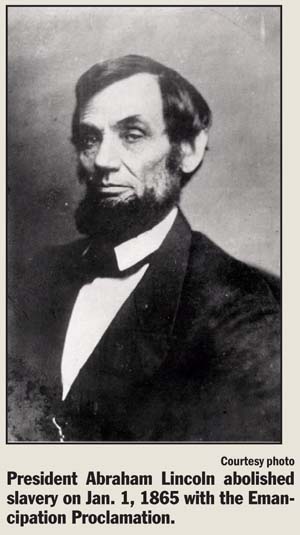 and year that the President of the United States, Abraham Lincoln, was assassinated by a promoter of white supremacy. The assassin was John Wilkes Booth. The message of white supremacists had always been the same. No Black individual or supporter thereof was ever safe unless white supremacy was the norm.
and year that the President of the United States, Abraham Lincoln, was assassinated by a promoter of white supremacy. The assassin was John Wilkes Booth. The message of white supremacists had always been the same. No Black individual or supporter thereof was ever safe unless white supremacy was the norm.
President Abraham Lincoln signed the Emancipation Proclamation that freed the slaves on January 1, 1865. Union General Tecumseh Sherman, and Secretary of War, Edwin Stanton, met with a large group of Black Baptist and Methodist Ministers to discuss what needed to be done after slavery was abolished. They met on January 12, 1865, in Savannah, Georgia. There was no doubt about what the freed slaves needed; they needed land.
The Need for Land After Emancipation
Union General Sherman and Secretary of War Stanton liked the idea of using formerly held Rebel plots of land. That action would get the freed slaves away from Union military lines. A special order was issued that all formerly held Rebel lands between Charleston, SC, and the St. John’s River in Florida would be given to free slaves in 40 acre plots. That, of course, didn’t happen, and freed slaves for the most part, stayed close to where they had been enslaved. That is what happened with the freed slaves at Liberia here in Upper Pickens County.
Land was not just given to freed slaves; they had to work for it. Neither did white land owners give their best land. This is what occurred at Liberia, according to Professor John Coggeshall, a Professor and Anthropologist at Clemson University, and author of Liberia, South Carolina: An African American Appalachian Community. Dr. Coggeshall’s book is available in paperback and hardback online. It is really an encyclopedia of information about this historic Liberia Community. For example, the second chapter is titled “You Zip Your Lips.” It tells about life in slavery here in the Pickens District as Dr. Coggeshall’s research pulls back the curtains for all to consider.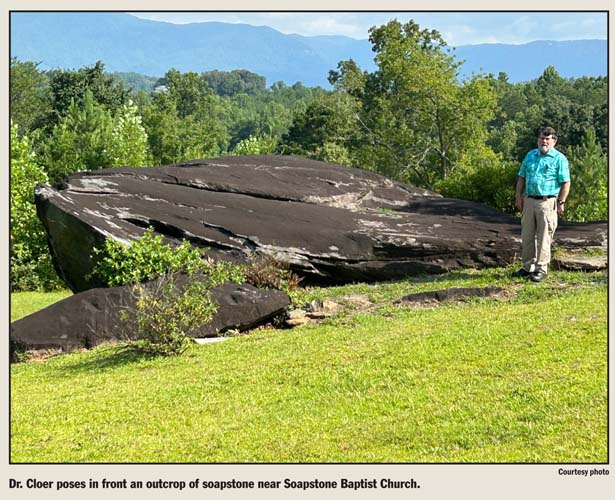
Many freed slaves in our area stayed close to their previous enslavement. They needed and wanted land. Soapstone was a hilly and rocky place at Liberia with no obvious place to cultivate. The soapstone mineral in the area had been formed from intense heat and moisture within the earth. The mineral has a soapy feel. Indigenous people used it for such things as utensils, bowls, and smoking pipes. The premises of Soapstone Baptist Church and Soapstone School have many beautiful soapstone outcroppings. They make for a real wonder and treat to see.
The property for the homes in the community of free slaves, where Soapstone Baptist Church and Soapstone School would be located, became home for the ancestors of Mable Owens Clarke. Mrs. Mable Owens Clarke is still there today as I write. She is a very busy Deacon at Soapstone Baptist Church today.
Next Week, Part 2: Reconstruction and White Backlash after Emancipation
About the Author: The author received his Bachelor’s Degree from Cumberland College in the Kentucky Mountains, his Master’s from Clemson, and his PhD. from the University of South Carolina. He was the first South Carolina Professor of the Year, being chosen by the Governor’s Office and the South Carolina Commission on Higher Education.
Courier Community Calendar 2-14-24
• Women Voters to discuss heath care
A program by the League of Women Voters entitled “Working Together for Better Health in Oconee and Pickens” will take place on February 20 from 7 – 8 p.m. at Clemson United Methodist Church located at 300 Frontage Road in Clemson. A panel that will include Misty Lee, Community Engagement Manager, Anderson, Oconee, Pickens and Greenville will dicuss the matter. The public is welcome
• PC Transportation Committee to meet
Pickens County Transportation Committee meeting will be held in the Pickens County Council Chambers located at
You must be logged in to view this content.
Subscribe Today or Login
Hagood Mill to host Deep Winter Blues
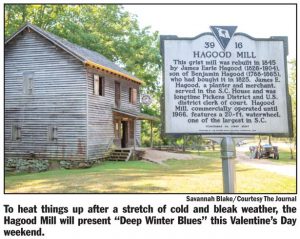
PICKENS — With Winter winding down, event organizers are promising a great day of music and memories on Saturday, Feb. 17 as the Hagood Mill presents “Deep Winter Blues”. The site is open 10 a.m. until 4 p.m.
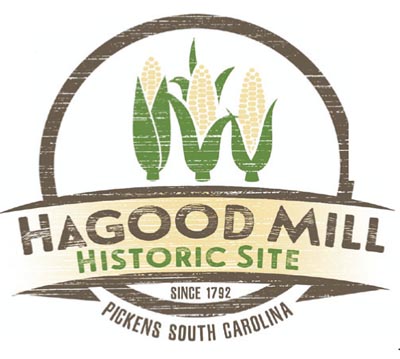 Upcountry South Carolina is a historical Mecca for the Blues. Throughout the 1920s and 1930s the streets of Laurens County, Greenville, Spartanburg, and Anderson reverberated with the music of bluesmen/street- preachers as they were strolling with
Upcountry South Carolina is a historical Mecca for the Blues. Throughout the 1920s and 1930s the streets of Laurens County, Greenville, Spartanburg, and Anderson reverberated with the music of bluesmen/street- preachers as they were strolling with
You must be logged in to view this content.
Subscribe Today or Login
Courier Obituaries 2-14-24
DEBRA A. ‘DEBBIE’ CARR
PICKENS — Debra A. “Debbie” Carr, 64, loving wife of seven and a half years to 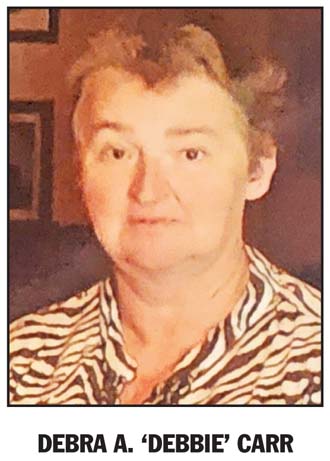 Richard G. Carr, passed away on Tuesday, Feb. 6, 2024, at Baptist Easley Hospital.
Richard G. Carr, passed away on Tuesday, Feb. 6, 2024, at Baptist Easley Hospital.
Born Aug. 18, 1959, in Pickens County, Debbie was the daughter of the late James F. Townes Sr. and Bertha Grant Townes. Debbie was a very sweet and outgoing person. She was a member of Bethany Church of God and taught Sunday school in her younger years. She loved collecting eagle portraits and statues and loved her Thomas Kincaid portraits.
Survivors include her husband, Richard Carr of Pickens; a brother, James F. Townes Jr.; and two sisters, Joyce T. McConnell (Rev. Carl McConnell) and Virgina Dianne Townes.
Mrs. Carr was predeceased by her parents, James F. Townes Sr. and Bertha Grant Townes.
A graveside service was held at Hillcrest Memorial Park in Pickens on Feb. 9.
Flowers will be accepted.
Mountain View Funeral Home – Pickens Chapel is serving the Carr family.
GRADY FLOYD ABERCROMBIE JR.
SUNSET — Grady Floyd Abercrombie Jr., 76, passed away on Monday, Feb. 5, 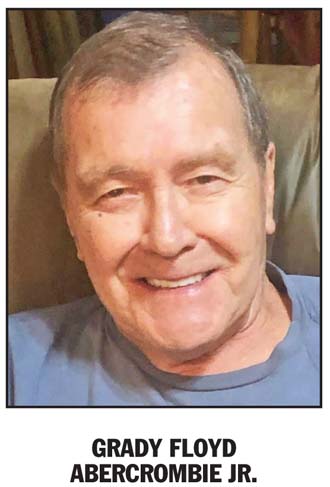 2024, at his home surrounded
2024, at his home surrounded









